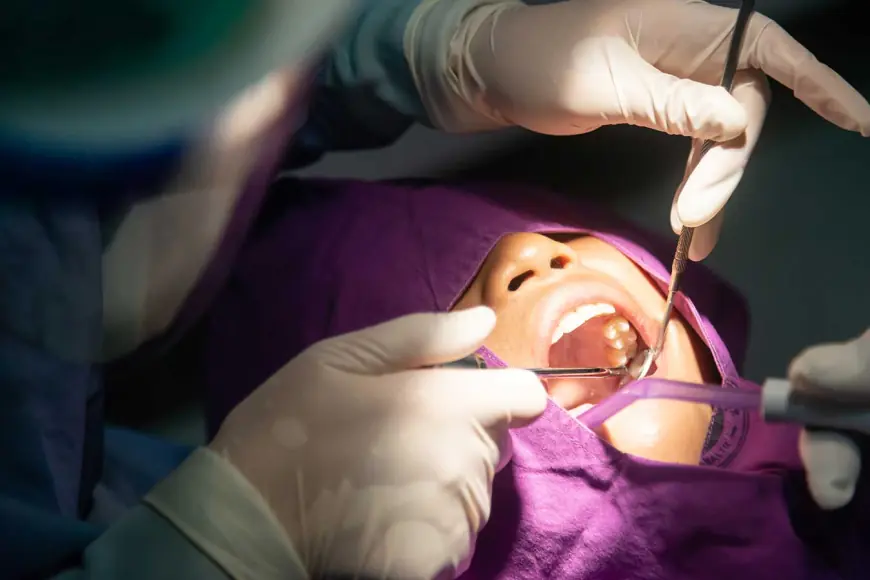Tooth Removal Aftercare: Keeping Your Mouth Healthy
Patients should avoid spitting, rinsing, or using straws during this period, as these actions may dislodge the clot and slow healing. Resting and keeping the head elevated further support blood clot stabilization.

Tooth extraction is sometimes necessary to protect long-term oral health, but the procedure itself is only the beginning. Proper aftercare is essential to ensure smooth recovery and prevent complications. For individuals undergoing Tooth Removal in Dubai, following recommended guidelines can help reduce pain, lower infection risks, and promote faster healing. By adopting the right care routine, patients can maintain a healthy mouth and transition comfortably after their extraction.
The Importance of Aftercare:
After a tooth removal, the mouth is left with an open wound that needs time to heal. Neglecting proper care increases the risk of complications such as dry socket, infections, or delayed recovery. Good aftercare not only minimizes discomfort but also ensures that the surrounding teeth and gums remain strong and healthy during the healing period.
Managing Bleeding:
Mild bleeding is common in the first 24 hours after extraction. Dentists usually provide a gauze pad to bite down on, which helps clot formation. Patients should avoid spitting, rinsing, or using straws during this period, as these actions may dislodge the clot and slow healing. Resting and keeping the head elevated further support blood clot stabilization.
Controlling Pain and Swelling:
Discomfort and swelling are normal after tooth removal but can be managed with medication and simple home remedies. Dentists may prescribe pain relievers or recommend over-the-counter options. Applying an ice pack to the cheek during the first day helps reduce swelling. After 24 hours, switching to warm compresses encourages faster healing.
Eating the Right Foods:
A soft-food diet plays a significant role in the recovery process. Patients should choose foods that are easy to chew and swallow, such as:
-
Mashed potatoes
-
Yogurt
-
Smoothies
-
Soups
-
Scrambled eggs
Hard, crunchy, or spicy foods should be avoided until the extraction site is stronger. Hydration is equally important, but patients should not use straws, as suction can disturb clot formation.
Oral Hygiene After Extraction:
Maintaining cleanliness in the mouth is crucial, but the extraction site must be treated with care. Patients should brush and floss as usual, while avoiding the surgical area for the first few days. Rinsing with warm salt water after 24 hours helps reduce bacteria and promote healing without irritating the wound.
Avoiding Harmful Habits:
Certain habits can delay healing or lead to complications. Patients should avoid:
-
Smoking or vaping
-
Drinking alcohol
-
Excessive physical activity
-
Touching the wound with fingers or tongue
These actions can disturb the healing tissue and significantly increase the risk of infection.
Recognizing Signs of Complications:
While most extractions heal smoothly, some warning signs may indicate complications. These include:
-
Severe or worsening pain after a few days
-
Persistent bleeding
-
Swelling that does not improve
-
Pus or foul odor from the site
-
Fever or chills
If any of these occur, patients should seek immediate dental care to prevent further issues.
Supporting Long-Term Oral Health:
After the initial healing, it is important to maintain a consistent oral hygiene routine. Regular brushing, flossing, and professional cleanings will help keep teeth and gums healthy. If tooth replacement options such as dental implants are planned, maintaining gum health during recovery is especially important.
The Role of Follow-Up Visits:
Follow-up appointments allow dentists to monitor healing progress and ensure the site is recovering properly. They may also provide additional cleaning, remove stitches if needed, and advise on the next steps for long-term oral care. These visits are key to preventing complications and ensuring a healthy recovery.
Final Thoughts:
Tooth removal is a straightforward procedure, but the healing process depends largely on how well patients follow aftercare instructions. By managing bleeding, controlling pain, eating soft foods, and practicing careful oral hygiene, recovery can be smooth and complication-free. For those undergoing Tooth Removal in Dubai, working closely with a trusted dentist and maintaining good aftercare habits ensures not only proper healing but also long-term oral health. A little care and attention during recovery go a long way in keeping your smile healthy and strong.
What's Your Reaction?
 Like
0
Like
0
 Dislike
0
Dislike
0
 Love
0
Love
0
 Funny
0
Funny
0
 Angry
0
Angry
0
 Sad
0
Sad
0
 Wow
0
Wow
0

















































